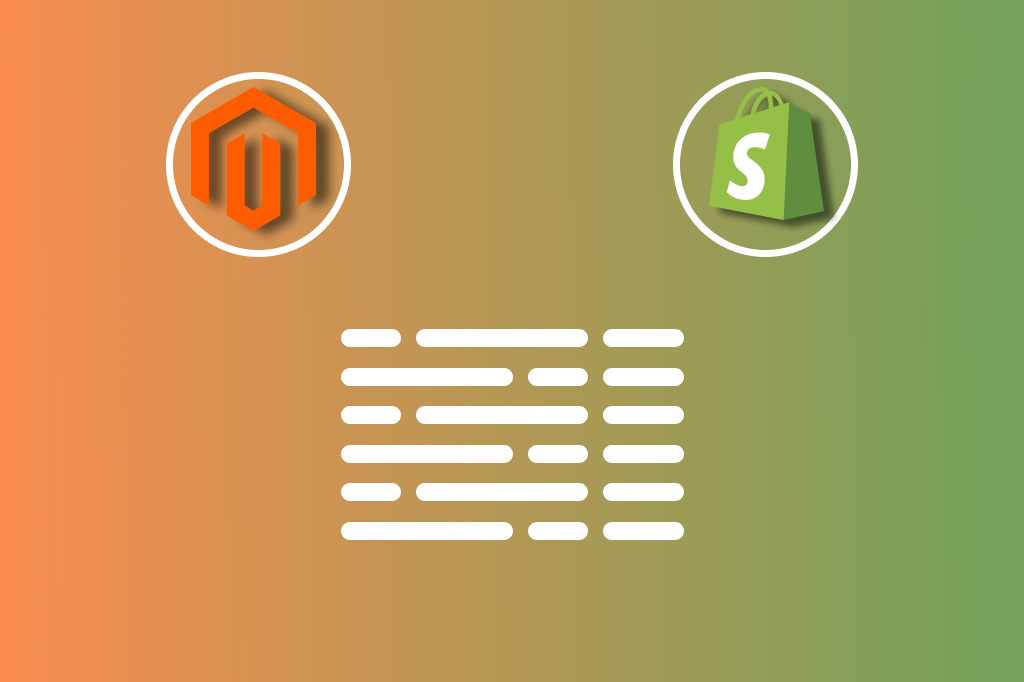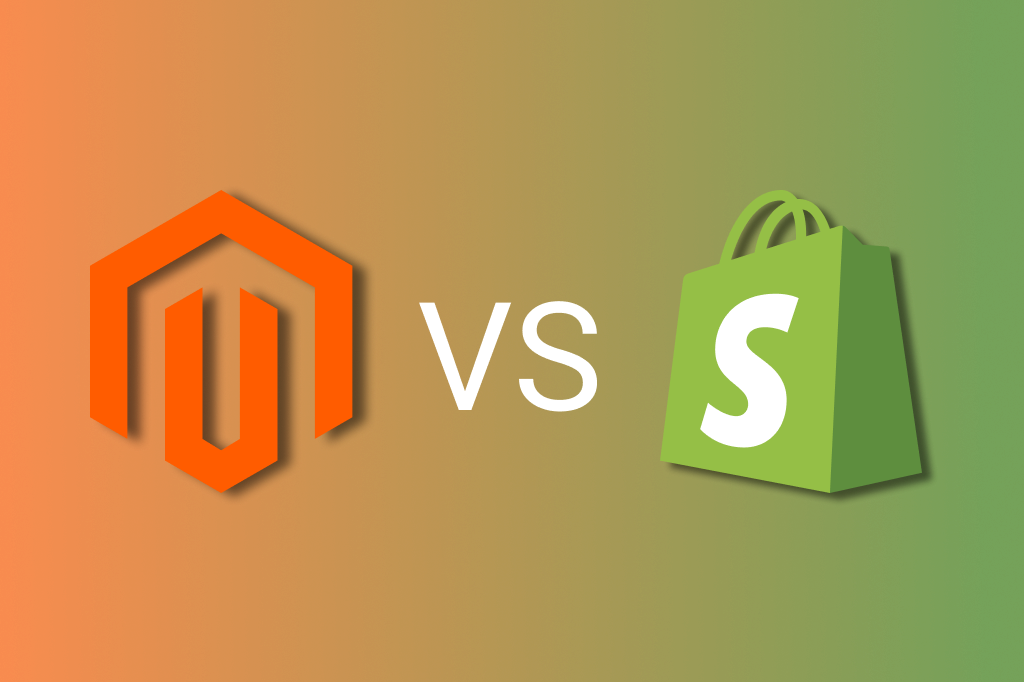The e-commerce platform market is overflowing with various solutions that allow entrepreneurs to open their online stores. It’s easy to get lost if you do not thoroughly know the differences between platforms from each other and their killer features. In this article, we’ll look at two competitors between whom there is a constant debate about the difference between Magento and Shopify. For our comparison, we’ve compiled the official Magento vs Shopify Comparison Guide, official specs of the Shopify platform, and our many years of experience with Magento. We’ll compare every aspect of these platforms and list the main pros and cons to help you make the right choice. Without further ado, let’s get started.
Table of Contents
Difference Between Magento and Shopify
To choose the ideal e-commerce platform for your business, you should know how each of them is doing in terms of the most basic selection criteria. For your convenience, we’ve collected essential criteria that users most often consider when choosing a platform and examined Magento and Shopify in detail to understand how they differ from each other.
Ease of Use and User-Friendliness
The first thing that interests many entrepreneurs is the ease of use of the platform and how easy it’s to learn how to work with the platform and all its nuances. This criterion is critical if you want to get to the market with your online store as quickly as possible. As a result, we start our comparison between Shopify and Magento with this aspect.
Shopify
Shopify is a straightforward platform for aspiring entrepreneurs, and the onboarding process shouldn’t take much of your time. Launching your store on this platform takes just a few short steps:
- Registration on the official website
- Filling in all the information about the future online store
- Filling out administrative and organizational sections
Besides that, Shopify has a friendly interface that combines simplicity and functionality. For example, the platform has drag and drop tools to customize the layout of various elements on the website.
Magento
If you are an aspiring entrepreneur, then Magento will be a tough nut to crack for you. Even despite the rapid deployment of a store, this process requires technical knowledge from the store owner. If you run a store alone, you will need the help of a professional team that specializes in working with Magento.
In addition, it will be difficult for beginners to get used to the Magento interface and its functionality. However, the steep learning curve rewards the user with one of the most flexible functionalities that allow you to customize every inch of your store and create the online store of your dreams. Magento can be modified from the inside if you have sufficient technical knowledge. This is one of the benefits of Magento over Shopify since Shopify is a closed platform that provides only the customization freedom that the developers have laid down in advance.
 Features List
Features List
The number of features and their variety directly affects the choice of the platform since you are unlikely to choose a platform for simple stores if you want to create a huge online store that requires special functionality to work properly. And in this aspect, you’ll see why Magento is better than Shopify.
Shopify
Shopify is primarily a platform for small businesses and supports small stores with a fairly modest list of key features:
- Unlimited number of products
- Point of Sale feature for in-person payments
- Secure access to administrator information
- Manual creation of orders
- Gift cards and discounts
- Free SSL certificate.
- 24/7/365 customer support
The number of features can be expanded by purchasing a more expensive package. For example, suppose you want to get detailed analytics on your store’s activity. In that case, you will need to take Shopify Advanced.
Magento
The list of Magento features differs from version to version. For example, Magento Open Source only covers the most basic features at the Shopify level. However, the full-fledged Magento version provides a reasonably wide functionality. Besides that, one of the advantages of Magento over Shopify is limitless customization, which allows you to add any features to your store. Here are just a few of the features available:
- Features for working with marketing and store promotion
- Search Engine Optimization tools
- Working with product catalogs
- Tools for full work with orders (checkout process, payment selection, shipping options, and more)
- Advanced analytics
- Working with store customer accounts
Hosting Type
Since you work with an online store, the type of hosting is of great importance since some features, security, and speed of the website depend on it.
Shopify
In the case of Shopify, you can forget about the headache of finding hosting. This platform is located in the cloud, and the work with server configuration, updates, and security aspects is entirely on the company’s shoulders. Nevertheless, you should keep in mind that this hosting format is very limited. You have minimal control over it. If you need special storage conditions for your customers’ data, cloud hosting may not be for you.
Magento
In response to Shopify’s simplicity, the Magento platform provides a wide range of hosting options. You can host your store on-site, in the cloud, or by entering into cooperation with third-party companies that offer hosting services. And whichever option you choose, you will always have full access to your hosting to modify the store and expand it. This is one of the benefits of Magento over Shopify.
Performance and Stability
Platform performance is one of the most important selection criteria since no entrepreneur wants to work with a slow store. High performance delights visitors and allows the store to quickly process orders and load pages, even under high loads.
Shopify
As we said earlier, this platform is perfect for small businesses with stores that don’t process many orders. In such conditions, you will be pleasantly surprised by the speed of Shopify. However, if you are looking to expand your business, this platform is not a good choice since, with traffic growth, you will feel a noticeable decrease in your store’s performance. In addition, you can’t influence the performance of your store in any way (make optimization to increase the speed of work) since all hosting and work with performance lies on the shoulders of Shopify.
Magento
Magento is a completely independent platform, you are in complete control of the entire situation, and your website’s performance is entirely your responsibility. You can optimize your website at any time to identify bottlenecks and increase performance. As you can see, Magento better than Shopify in terms of performance.
Search Engine Optimization Perspectives
According to research, about 46% of all e-commerce traffic comes from simple searches through search engines. And as you understand, to make the most out of this traffic, your platform must have advanced SEO capabilities.
Shopify
The Shopify platform has modest SEO capabilities. However, the core functionality is still there. You can easily customize meta tags, optimize product pages, edit website structure. In addition, you can implement various third-party extensions that affect the SEO part. However, the more extensions you implement, the slower the platform will work. Also, keep in mind that you can’t perform any server settings or change the URL structure.
Magento
This is the main difference between Magento and Shopify. Magento offers users ample opportunity to customize the SEO part of your online store. In addition to the most basic functions, the platform allows you to customize and change no-follow links, redirects, canonical tags, permalinks and meta tags, URLs.

Payment Options
To improve the user experience, it’s good practice to provide multiple payment methods. However, each platform is unique and has its policy of implementing different payment methods for purchases. Now, let’s find out is Magento better than Shopify in this aspect.
Shopify
Shopify leads this round, offering direct support for over 70 different payment gateways. However, you shouldn’t be overjoyed. The platform charges a commission from each transaction for using third-party gateways, and the amount of the commission depends on your tariff plan.
| Plan | Fee |
| Shopify Basic | 2.9% + 30¢ USD |
| Shopify | 2.6% + 30¢ USD |
| Shopify Advanced | 2.4% + 30¢ USD |
Magento
If you choose the Magento platform, your choice of payment gateways can be disappointing, as you only have three: PayPal, Authorize.net, and Stripe. However, the platform’s flexibility allows you to implement any other payment gateway if you have the technical knowledge. In addition, the use of third-party gateways is free, and this is why Magento is better than Shopify.
Security
The security of your customers and your store’s data should come first. After all, not a single businessman wants to suffer reputational losses and lose business since he ignored the safety aspect.
Shopify
Because Shopify is cloud-hosted, it is reasonably secure, complies with all six categories of PCI standards, and includes SSL encryption for maximum privacy. Developers also encourage finding security vulnerabilities, and patches are released extremely quickly.
Magento
Using the Magento platform, the security of your data and your hosting is entirely your responsibility. As a result, before launching a store, you should consult with website security specialists to not miss anything important. However, the Magento platform itself is also quite secure, and each platform update contains countless improvements to protect against emerging new cyber threats.
Pricing Policy
We have come to the final criterion, namely Magento vs Shopify pricing policy. This aspect is decisive for many entrepreneurs.
Shopify
Shopify offers three different plans to choose from with a different set of features to suit the different needs of the entrepreneur:
- Shopify Basic: $29 per month
- Shopify: $79 per month
- Shopify Advanced: $299 per month
Besides that, there’s another version called Shopify Plus. And when there’s a talk about Shopify Plus vs Magento 2 commerce it’s all about the price. Shopify Plus is an enterprise version of Shopify which is distributed separately and has its own price:
- Shopify Plus: $2000 per month + 2.15% per transaction
Magento
The price of using Magento varies greatly depending on the platform version and store’s gross sales revenue:
- Magento Open Source: Free
- Magento Commerce: from $22,000 to $125,000 per year
- Magento 2 Cloud: from $40,000 to $190,000 per year
And if you are looking for alternatives, check our list of eCommerce platforms similar to Shopify.

Magento vs Shopify Difference Table
To clarify the differences between the platforms, we have combined all of the above criteria into a comparative table.
| Criteria | Magento | Shopify |
| Ease of use and user-friendliness | A steep learning curve, suitable for advanced users | Suitable for beginners, fast onboarding |
| Features list | Basic + numerous advanced features | Basic |
| Hosting type | Independent platform, hosting type is the matter of store owner choice | Cloud-hosted by the vendor |
| Performance and stability | Great performance in any-size stores | Suitable for small-medium stores only |
| SEO options | Basic + advanced | Limited basic options |
| Payment options | 3 gateways + opportunity to implement your own (requires tech knowledge) | 70+ different gateways, each transaction is subject to a fee |
| Security | Secure platform with hosting security completely on owners hands | Security is fully on vendors hands |
| Pricing policy |
|
|
Final Thoughts: Pros and Cons Magento vs Shopify
Let’s summarize our comparison by listing the main strengths and weaknesses of each platform.
Shopify Pros and Cons
| Pros | Cons |
| Multichannel selling to sell your products through Facebook, Instagram, Amazon, and eBay simultaneously | Not-so-great performance with large stores |
| A large variety of supported payment gateways | Each payment is subject to a fee |
| User-friendly | Limited SEO options |
Magento Pros and Cons
| Pros | Cons |
| Great flexibility and customization opportunities | A steep learning curve |
| Supports any-size business | Installation requires technical knowledge |
| Incredible performance | Further maintenance is fully in the hands of the store owner |
We hope you have already decided which platform best suits your requirements by the final stage of our Magento commerce vs Shopify comparison. These are two excellent platforms that are designed to satisfy different needs. Shopify is suitable for newbie sellers, while Magento is the best choice for experienced entrepreneurs. In any case, if you have any questions about working with Magento or if you want to switch to this platform, drop us a line, and our Sam-Ecommerce representative will contact you to answer all your questions.












Published in: